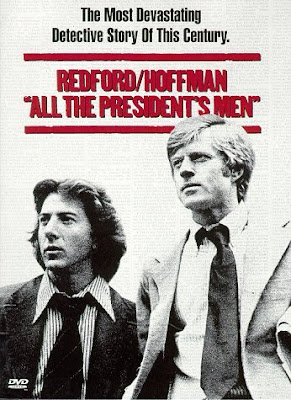
All The President’s Men is one of the films that help found the political thriller, and like so many that have come after it, it features a journalist as the hero. (Or rather, two journalists.) But unlike almost any of its successors, the focus of All The President’s Men is not the story or the face behind the conspiracy, but rather journalism itself. In dealing with a conspiracy where everyone already knows who the conspirators are, All The President’s Men is free to focus on the details of the how rather than the who. In fact, once the how has been dealt with, the film abruptly ends.
Bob Woodward and Carl Bernstein (Robert Redford and Dustin Hoffman) were the Washington Post journalists who, in following up what started as a relatively small break-in at the Democratic party’s national headquarters in the Watergate building. As they follow where the leads go, the film wonderfully captures the incredulity felt by the editors, and at times even Woodward and Bernstein themselves.
There are some wonderful scenes. For instance, the tension when Woodward first meets Deep Throat in a multi-story car park is palpable. It’s a wonderful location. The sense of claustrophobia that the garage elicits, the paranoia that the shadows create, the danger suggested by the flame of Deep Throat’s lighter penetrating the shadows – all of these things make the Deep Throat scenes some of the best in the film.
There is a wonderful focus on journalism in the film, the mechanics of breaking a story – the endless waiting, the tedious search for sources willing to talk, the exhilaration of finally finding a source, the long hours, the endless phone calls and face to face meetings. In fact, by focusing on the how with such intent, the film distracts us from the fact that we know the ending, that we know where all the pieces will lie, and allows us to follow the story as Woodward and Bernstein break it.
Interestingly, the film doesn’t focus on any of the characters outside of their involvement with the story. We see nothing of our protagonists’ private lives, and nothing of their characters outside of what they do to break the story. This choice firmly roots the film’s focus as a story about the story, suggesting that it is the story that is the most important thing here, not the people who helped break it.
There is a reason that All The President’s Men is considered a classic, and if you haven’t seen it, then I suggest you do, and discover that reason for yourself. Whole-heartedly recommended. A+.
All The President’s Men
Review by
Dibbler
on
Tuesday, May 05, 2009
![]()
Film: All The President’s Men
Subscribe to:
Post Comments (Atom)




No comments:
Post a Comment